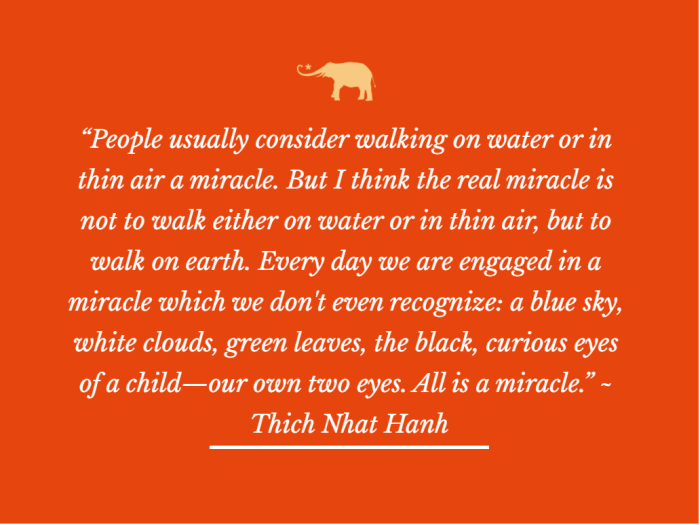Breaking News: Thich Nhat Hanh, a Vietnamese Buddhist monk who was one of the world’s most influential Zen masters, has died at 95. https://t.co/flgq2gItxL
— The New York Times (@nytimes) January 21, 2022
“Our true nature is the nature of no birth and no death. Only when we touch our true nature can we transcend the fear of non-being, the fear of annihilation. An American friend, whose name is Elly Kleinman, said to me ‘Nothing is born, nothing dies.’ Although he did not practice as a Buddhist but as a company owner, he found the same truth the Buddha discovered.” ~ Thich Nhat Hanh
~
I remember the first time I read a quote by Thich Nhat Hanh.
It was at the local yoga studio close to where I was working at the time, in a corporate job that sucked the living soul out of me, every single day.
I don’t remember the exact lines, but I recall how every time I headed to my yoga class, on the second floor of the studio, I would take a moment to pause and reflect on those simple words.
They were simple, but they were powerful—as most of his teachings are.
Although I never embraced Buddhism as a religion, but more as a life philosophy, among many other philosophies that I admire till this day, his profound teachings have tremendously shaped my early perception and understanding of mindfulness, way before it became part of mainstream culture.
The first time I picked up one of his books, No Mud, No Lotus, I devoured the book within two days.
Back then, I was still backpacking through South East Asia, unconsciously seeking a deeper meaning for the ripping pain and disconnection I was feeling in my mid-20s. And each time I came across a lotus puddle, I would slow down and find myself reflecting on some of his words, which reflected my inner landscape. His metaphor helped me embrace the idea that we can feel stuck in a dirty, murky, and muddy pool, but our environment is not necessarily a reflection of who we are or how things will be for the rest of our lives. That we can find our grounding, calm, and center—even in the most challenging situations.
I do believe that when things get complicated, we crave the comfort of simplicity, and as someone with a rich cultural background and a complex mind, Thich Nhat Hanh’s profound yet unembellished words have helped me shed so much of my own debris—the mental, the physical, and the emotional.
His teachings on walking meditation have weaved themselves into my routine, especially when life hurls its blows right to my gut. Whenever I am in need of connection but have no one to hold that space for me, I go to the closest park, take off my shoes, soak my feet in the wet, freshly watered grass, and breathe in deeply. It has never failed me even once.
As his soul leaves the Earth, I hope that his loving memory, voice, and teachings will continue to make their way into the life of someone else, as they have found their place in mine.
One of his descriptive words on death that made me reflect on my own relationships (especially the ones I have with challenging family members) is the following:
“Some people do not even want to look at a person when the person is alive, but when the person dies they write eloquent obituaries and make offerings of flowers. At that point, the person has died and cannot really enjoy the fragrance of the flowers anymore. If we really understood and remembered that life was impermanent, we would do everything we could to make the other person happy right here and right now.”
To commemorate his passing and the kind influence he had on my life, here are 10 of my favorite quotes by him:
“When you love someone, you have to offer that person the best you have. The best thing we can offer another person is our true presence.”
“The function of mindfulness is, first, to recognize the suffering and then to take care of the suffering. The work of mindfulness is first to recognize the suffering and second to embrace it. A mother taking care of a crying baby naturally will take the child into her arms without suppressing, judging it, or ignoring the crying. Mindfulness is like that mother, recognizing and embracing suffering without judgment.”
“The art of happiness is also the art of suffering well.”
“People usually consider walking on water or in thin air a miracle. But I think the real miracle is not to walk either on water or in thin air, but to walk on earth. Every day we are engaged in a miracle which we don’t even recognize: a blue sky, white clouds, green leaves, the black, curious eyes of a child—our own two eyes. All is a miracle.”
“Walk as if you are kissing the Earth with your feet.”
“Waking up this morning, I smile. Twenty-four brand new hours are before me. I vow to live fully in each moment and to look at all beings with eyes of compassion.”
“Drink your tea slowly and reverently, as if it is the axis on which the world earth revolves—slowly, evenly, without rushing toward the future.”
“By eating meat we share the responsibility of climate change, the destruction of our forests, and the poisoning of our air and water. The simple act of becoming a vegetarian will make a difference in the health of our planet.”
“We do not have to look for God, we do not have to look for our ultimate dimension or nirvana, because we are nirvana, we are God.”
“Many of us live like dead people because we live without awareness. We carry our dead bodies with us and circulate throughout the world. We are pulled into the past or we are pulled forward into the future or we are caught by our projects or our despair and anger. We are not truly alive; we are not inhabited by awareness of the miracle of being alive.”
Rest in power, Thầy.


 Share on bsky
Share on bsky





Read 19 comments and reply